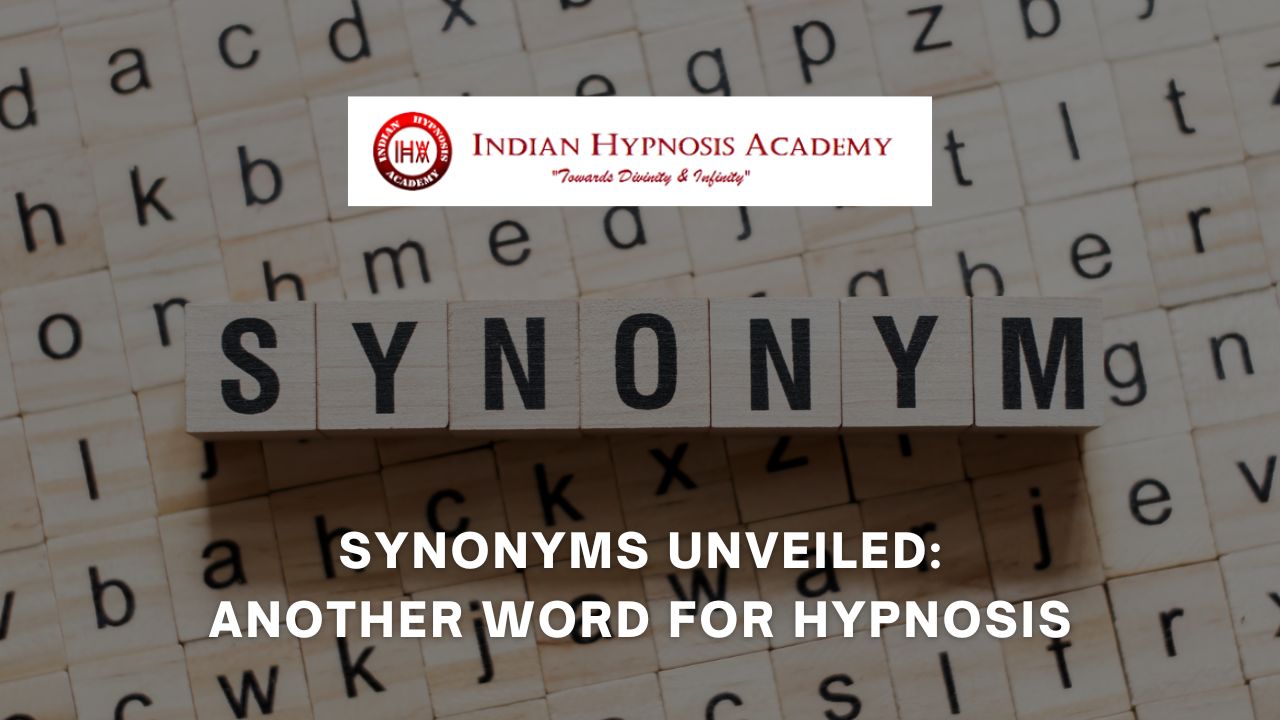Step into the realm of the mind, where hidden depths and untapped potential await. Welcome to the captivating world of hypnosis! This fascinating practice has intrigued and captivated people for centuries, offering a gateway to altered states of consciousness and the power to unlock our innermost thoughts. But what if I told you that there’s another word for hypnosis? Yes, dear reader, today we are going on a linguistic journey as we unveil the synonyms that exist in this realm. Prepare yourself for an exploration beyond traditional terminology, as we delve into uncharted linguistic territory and discover new ways to describe this ancient art form. So buckle up, open your mind wide, because it’s time to uncover yet another doorway into the mystical realms of human consciousness!
Defining Hypnosis
What exactly is hypnosis? At its core, hypnosis is a state of focused attention and heightened suggestibility. When someone is hypnotized, they enter into a trance-like state where their conscious mind becomes more relaxed and receptive to suggestions. It’s like taking a journey deep within ourselves, exploring the inner workings of our subconscious.
In this altered state, individuals can experience enhanced concentration and focus, allowing them to tap into their deepest thoughts and emotions. It’s as if we are unlocking doors that were previously hidden away in the recesses of our minds.
Hypnosis has been used for various purposes throughout history. From ancient civilizations using it for spiritual rituals to modern-day applications in therapy and self-improvement, its versatility knows no bounds.
But what about those alternative words for hypnosis? What do they entail? How do they differ from traditional hypnosis techniques? Let’s dive deeper into this linguistic exploration to find out!
The History of Hypnosis and its Uses
The history of hypnosis is a fascinating journey into the depths of the human mind. It dates back thousands of years, with early records indicating its use in ancient civilizations such as Egypt and Greece. In these cultures, hypnosis was believed to be a spiritual practice that connected individuals with higher realms of consciousness.
During the 18th and 19th centuries, hypnosis gained recognition as a legitimate medical technique. Renowned figures like Franz Mesmer and James Braid played pivotal roles in popularizing its therapeutic applications. Hypnosis was used to alleviate pain, treat psychological disorders, and even aid surgical procedures.
In the early 20th century, Sigmund Freud integrated hypnosis into his psychoanalytic approach to therapy. He believed that accessing the subconscious through hypnotic trance could uncover repressed memories and facilitate healing.
Over time, hypnosis has evolved beyond traditional methods. Today it is commonly utilized for smoking cessation, weight loss, anxiety reduction, phobia treatment, and performance enhancement. Modern techniques incorporate visualization exercises, guided imagery scripts or recordings along with deep relaxation techniques.
Despite its long-standing history and proven efficacy in many cases; there remains some controversy surrounding hypnosis—skeptics question its effectiveness while others worry about potential misuse or manipulation by unscrupulous practitioners.
As new research continues to shed light on the power of our minds; alternative terms have emerged to describe similar states of focused attention or altered consciousness without using the word “hypnosis.” Some prefer terms like “guided meditation,” “relaxation therapy,” or even “brain training.”
Common Synonyms for Hypnosis
When it comes to discussing the world of hypnosis, it’s important to explore the various synonyms that people often use interchangeably with this fascinating technique. While some synonyms may accurately capture certain aspects of hypnosis, others may not fully encapsulate its true essence.
One common synonym for hypnosis is “trance.” The word “trance” implies a state of deep focus and concentration, similar to what one experiences during a hypnotic session. It suggests a temporary shift in consciousness where individuals become highly receptive to suggestions and are able to tap into their subconscious mind.
Another commonly used term is “mesmerism,” derived from the work of 18th-century physician Franz Mesmer. This term refers specifically to inducing an altered state through intense concentration or fixation on an object or person. Mesmerism often involves physical touch or manipulation, although modern forms of hypnosis have evolved beyond these methods.
The term “suggestibility” also frequently arises in conversations about hypnosis. Suggestibility refers to an individual’s capacity to accept and act upon suggestions given by another person. In the context of hypnosis, suggestibility plays a crucial role as subjects must be open and responsive for effective results.
It’s worth noting that while these terms share similarities with hypnosis, they do not entirely capture its multifaceted nature. Hypnosis encompasses more than just inducing trance-like states or invoking suggestibility; it involves tapping into one’s inner resources and facilitating personal growth and transformation.
By understanding these common synonyms, we can appreciate different perspectives on the practice but also recognize that none can fully substitute for the concept of hypnosis itself. Each synonym offers glimpses into specific aspects but fails to encompass its entirety.
In future discussions about this intriguing field, keep in mind that while there are synonymous terms associated with hypnotherapy, nothing truly replaces the unique experience offered by genuine hypnotic techniques!
How These Synonyms Differ from Hypnosis
Synonyms are words that have similar meanings, but when it comes to hypnosis, the synonyms may differ in their nuances and connotations. While they all share a commonality of inducing an altered state of consciousness, each synonym brings its own unique approach and perspective.
One popular synonym for hypnosis is “mesmerism.” This term derives from Franz Mesmer, an Austrian physician who believed in the power of magnetic forces to heal. Mesmerism focuses on the idea of influencing someone’s thoughts or behaviors through a magnetic energy transfer.
Another word often used interchangeably with hypnosis is “trance.” Trance implies a state of deep relaxation and heightened suggestibility. It emphasizes the individual’s ability to enter into a calm and focused mental space where they become more receptive to suggestions.
A less common synonym for hypnosis is “enchantment.” This term evokes images of magic and spells, suggesting that during hypnotic sessions, individuals are under some sort of spell or enchantment that alters their perceptions and behaviors.
While these synonyms share similarities with hypnosis, it’s important to note their subtle distinctions. Hypnosis encompasses various techniques aimed at tapping into the subconscious mind for therapeutic purposes. Each synonym may emphasize different aspects or approaches within this broader concept.
Understanding how these synonyms differ from traditional concepts of hypnosis allows us to appreciate the diverse perspectives surrounding this practice. Whether we use mesmerism, trance-like states, or speak about being enchanted by hypnotic experiences – ultimately what matters most is finding an approach that resonates with each individual seeking personal growth or healing through altered statesof consciousness.
The Controversy Surrounding the Term
Ah, controversy – it seems to follow us everywhere we go. And the term “hypnosis” is no exception. While some embrace it as a powerful tool for personal transformation and healing, others view it with skepticism and suspicion.
One of the main points of contention surrounding hypnosis is its perceived connection to mind control. Some argue that by inducing a trance-like state, hypnotists can manipulate individuals into doing things against their will or belief systems. This fear has been perpetuated in popular culture, with movies portraying hypnosis as a sinister force used for nefarious purposes.
Another bone of contention lies in the scientific community’s lack of consensus on how hypnosis actually works. Is it simply suggestion? Or does it tap into deeper levels of consciousness? The debate rages on, leaving skeptics unconvinced and proponents frustrated by the lack of concrete evidence.
Furthermore, there are those who question whether hypnosis is just an elaborate placebo effect. They argue that any benefits experienced during a session may be attributed to suggestibility rather than any inherent power within hypnosis itself.
Despite these controversies, many people continue to find value in exploring altered states of consciousness through techniques such as guided imagery or meditation. These practices offer alternative avenues for achieving similar results without invoking the contentious label “hypnosis.”
New Terminology for Modern Techniques
As the field of hypnosis continues to evolve, so does its terminology. With advancements in research and practice, new terms are emerging to describe modern techniques being used today.
One such term is “neuro-linguistic programming” or NLP for short. This approach focuses on the connection between language, thoughts, and patterns of behavior. NLP practitioners use various techniques to help individuals reprogram their minds and achieve desired outcomes.
Another term gaining popularity is “mindfulness-based hypnotherapy.” This technique combines elements of traditional hypnosis with mindfulness practices borrowed from Eastern traditions like Buddhism. By cultivating present-moment awareness and deep relaxation, individuals can tap into their subconscious mind more easily.
Additionally, “virtual reality therapy” has become a buzzword within the field. Using virtual reality technology, therapists create immersive environments that simulate real-life situations where clients can confront fears or work through trauma in a safe space.
Lastly, “integrative hypnosis” is an umbrella term encompassing a variety of approaches that integrate different therapeutic modalities like cognitive-behavioral therapy (CBT) or solution-focused brief therapy (SFBT). The goal is to tailor the hypnotic experience to fit each individual’s unique needs and preferences.
These new terminologies reflect how the field of hypnosis continues to expand and adapt as practitioners explore innovative ways to help their clients overcome challenges and improve their lives. Exciting developments await as researchers delve deeper into these modern techniques!
Conclusion
While there are several synonyms for hypnosis, such as mesmerism, trance, and suggestion, it is important to recognize that these terms differ in their nuances and historical contexts. While they may share some similarities with hypnosis in terms of inducing a relaxed state or influencing behavior, each term carries its own unique connotations.
The controversy surrounding the term “hypnosis” highlights the ongoing debate within the field of psychology and alternative therapies. Some argue that the word itself has negative associations or misconceptions that hinder its acceptance as a legitimate practice. This has led to the development of new terminology for modern techniques aimed at distancing themselves from traditional notions of hypnotism.
As our understanding of human consciousness continues to evolve, so too does our language and terminology. It is only natural that new words and phrases emerge to describe innovative approaches to therapy and personal development. By embracing these changes while also honoring the rich history of hypnosis, we can create a more inclusive and comprehensive framework for exploring altered states of awareness.
Whether you prefer to call it hypnosis or use one of its many synonyms, what matters most is finding an approach that resonates with you personally. Whether you seek relaxation, self-improvement, or healing – there are countless paths available today that offer similar benefits under different names.
So explore various techniques beyond traditional hypnosis; discover what works best for you on your journey towards self-discovery and transformation!




